Corporate Law: Director Duties Analysis - All Mine Pty Ltd Case
VerifiedAdded on 2023/04/22
|10
|2300
|228
Case Study
AI Summary
This case study evaluates whether Lillian and Gumpta, directors of All Mine Pty Ltd, violated their duties under the Corporations Act 2001. It assesses their actions against provisions regarding care, diligence, good faith, proper use of position and information, and insolvent trading. The analysis incorporates relevant case law, such as ASIC v Padbury Mining Limited and Commonwealth Bank of Australia v Friedrich, to determine if Lillian and Gumpta breached their fiduciary responsibilities. Lillian's failure to monitor the company's financial status and Gumpta's prioritization of personal sales targets over company interests are scrutinized. The report concludes by outlining potential legal consequences, including civil penalties and possible criminal charges, for their violations.

Corporate Law
Paraphrase This Document
Need a fresh take? Get an instant paraphrase of this document with our AI Paraphraser
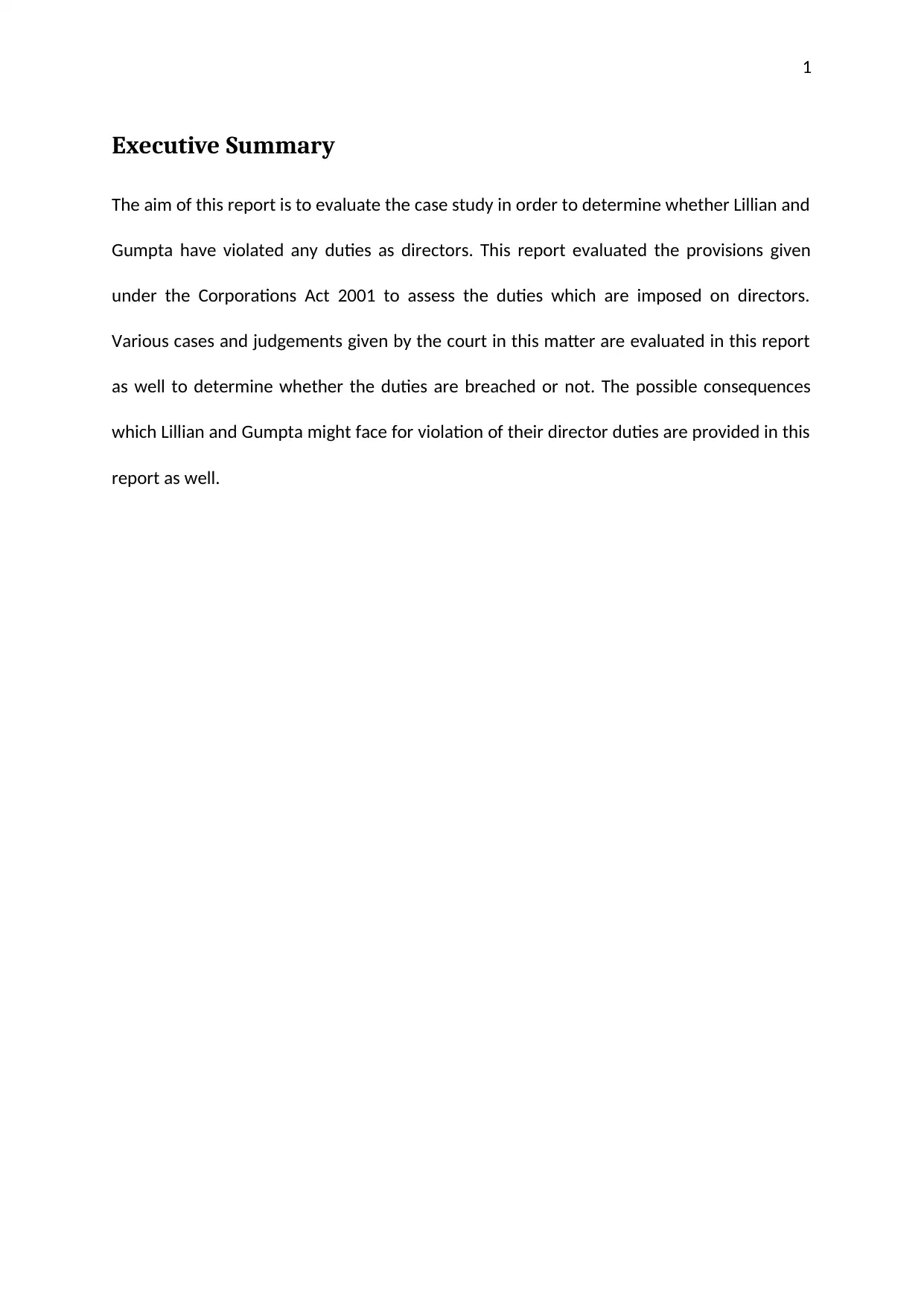
1
Executive Summary
The aim of this report is to evaluate the case study in order to determine whether Lillian and
Gumpta have violated any duties as directors. This report evaluated the provisions given
under the Corporations Act 2001 to assess the duties which are imposed on directors.
Various cases and judgements given by the court in this matter are evaluated in this report
as well to determine whether the duties are breached or not. The possible consequences
which Lillian and Gumpta might face for violation of their director duties are provided in this
report as well.
Executive Summary
The aim of this report is to evaluate the case study in order to determine whether Lillian and
Gumpta have violated any duties as directors. This report evaluated the provisions given
under the Corporations Act 2001 to assess the duties which are imposed on directors.
Various cases and judgements given by the court in this matter are evaluated in this report
as well to determine whether the duties are breached or not. The possible consequences
which Lillian and Gumpta might face for violation of their director duties are provided in this
report as well.
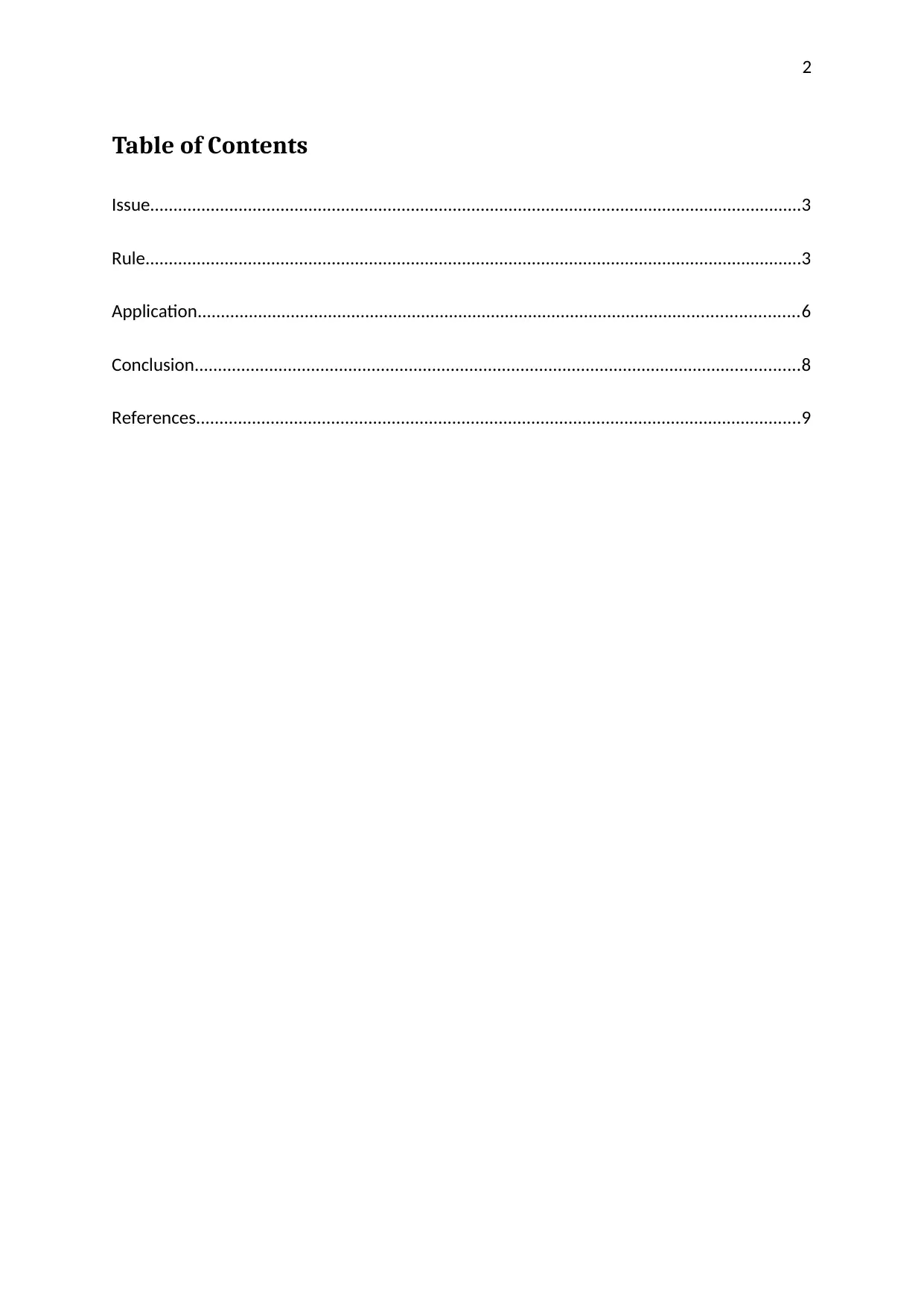
2
Table of Contents
Issue............................................................................................................................................3
Rule.............................................................................................................................................3
Application.................................................................................................................................6
Conclusion..................................................................................................................................8
References..................................................................................................................................9
Table of Contents
Issue............................................................................................................................................3
Rule.............................................................................................................................................3
Application.................................................................................................................................6
Conclusion..................................................................................................................................8
References..................................................................................................................................9
⊘ This is a preview!⊘
Do you want full access?
Subscribe today to unlock all pages.

Trusted by 1+ million students worldwide
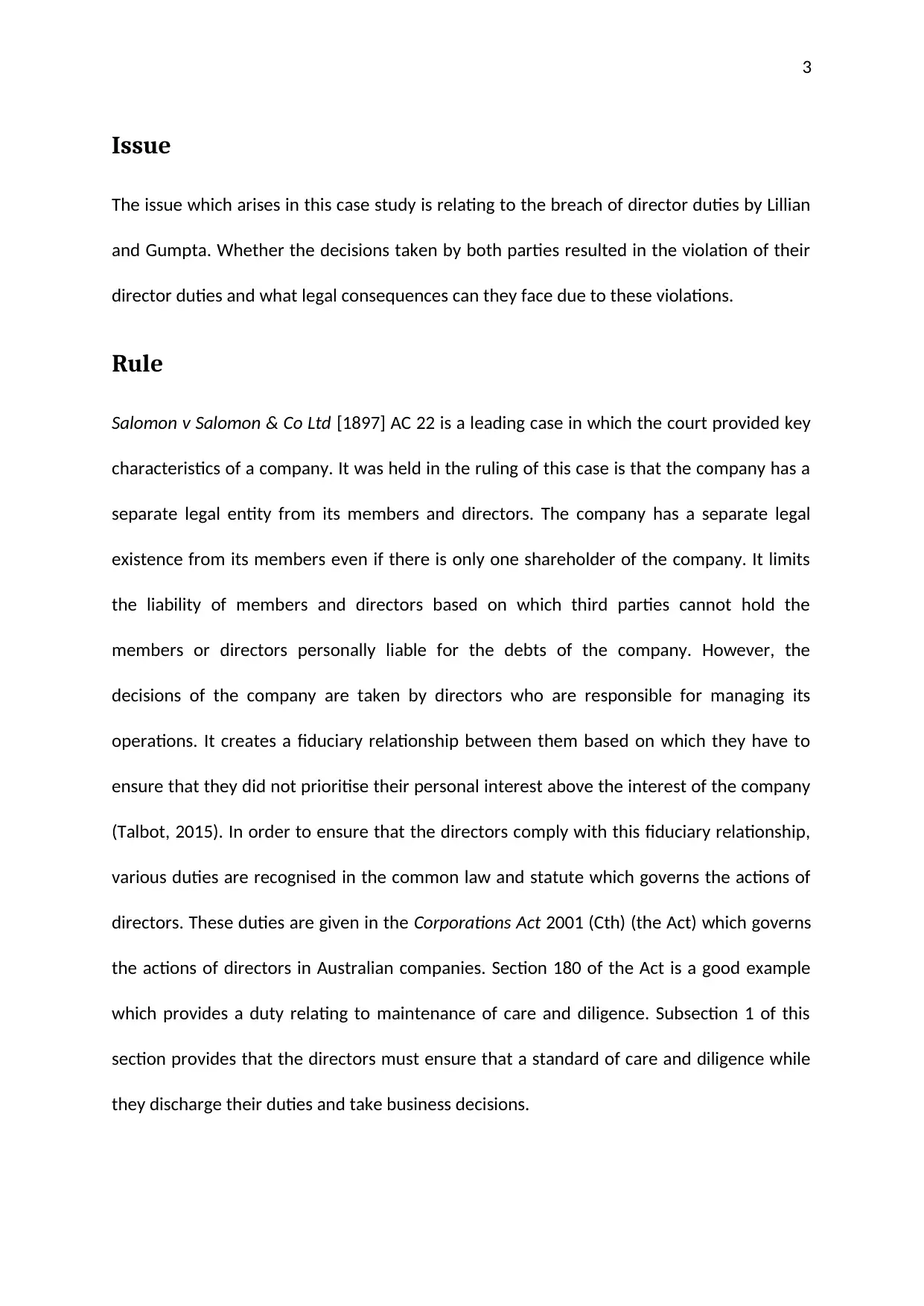
3
Issue
The issue which arises in this case study is relating to the breach of director duties by Lillian
and Gumpta. Whether the decisions taken by both parties resulted in the violation of their
director duties and what legal consequences can they face due to these violations.
Rule
Salomon v Salomon & Co Ltd [1897] AC 22 is a leading case in which the court provided key
characteristics of a company. It was held in the ruling of this case is that the company has a
separate legal entity from its members and directors. The company has a separate legal
existence from its members even if there is only one shareholder of the company. It limits
the liability of members and directors based on which third parties cannot hold the
members or directors personally liable for the debts of the company. However, the
decisions of the company are taken by directors who are responsible for managing its
operations. It creates a fiduciary relationship between them based on which they have to
ensure that they did not prioritise their personal interest above the interest of the company
(Talbot, 2015). In order to ensure that the directors comply with this fiduciary relationship,
various duties are recognised in the common law and statute which governs the actions of
directors. These duties are given in the Corporations Act 2001 (Cth) (the Act) which governs
the actions of directors in Australian companies. Section 180 of the Act is a good example
which provides a duty relating to maintenance of care and diligence. Subsection 1 of this
section provides that the directors must ensure that a standard of care and diligence while
they discharge their duties and take business decisions.
Issue
The issue which arises in this case study is relating to the breach of director duties by Lillian
and Gumpta. Whether the decisions taken by both parties resulted in the violation of their
director duties and what legal consequences can they face due to these violations.
Rule
Salomon v Salomon & Co Ltd [1897] AC 22 is a leading case in which the court provided key
characteristics of a company. It was held in the ruling of this case is that the company has a
separate legal entity from its members and directors. The company has a separate legal
existence from its members even if there is only one shareholder of the company. It limits
the liability of members and directors based on which third parties cannot hold the
members or directors personally liable for the debts of the company. However, the
decisions of the company are taken by directors who are responsible for managing its
operations. It creates a fiduciary relationship between them based on which they have to
ensure that they did not prioritise their personal interest above the interest of the company
(Talbot, 2015). In order to ensure that the directors comply with this fiduciary relationship,
various duties are recognised in the common law and statute which governs the actions of
directors. These duties are given in the Corporations Act 2001 (Cth) (the Act) which governs
the actions of directors in Australian companies. Section 180 of the Act is a good example
which provides a duty relating to maintenance of care and diligence. Subsection 1 of this
section provides that the directors must ensure that a standard of care and diligence while
they discharge their duties and take business decisions.
Paraphrase This Document
Need a fresh take? Get an instant paraphrase of this document with our AI Paraphraser
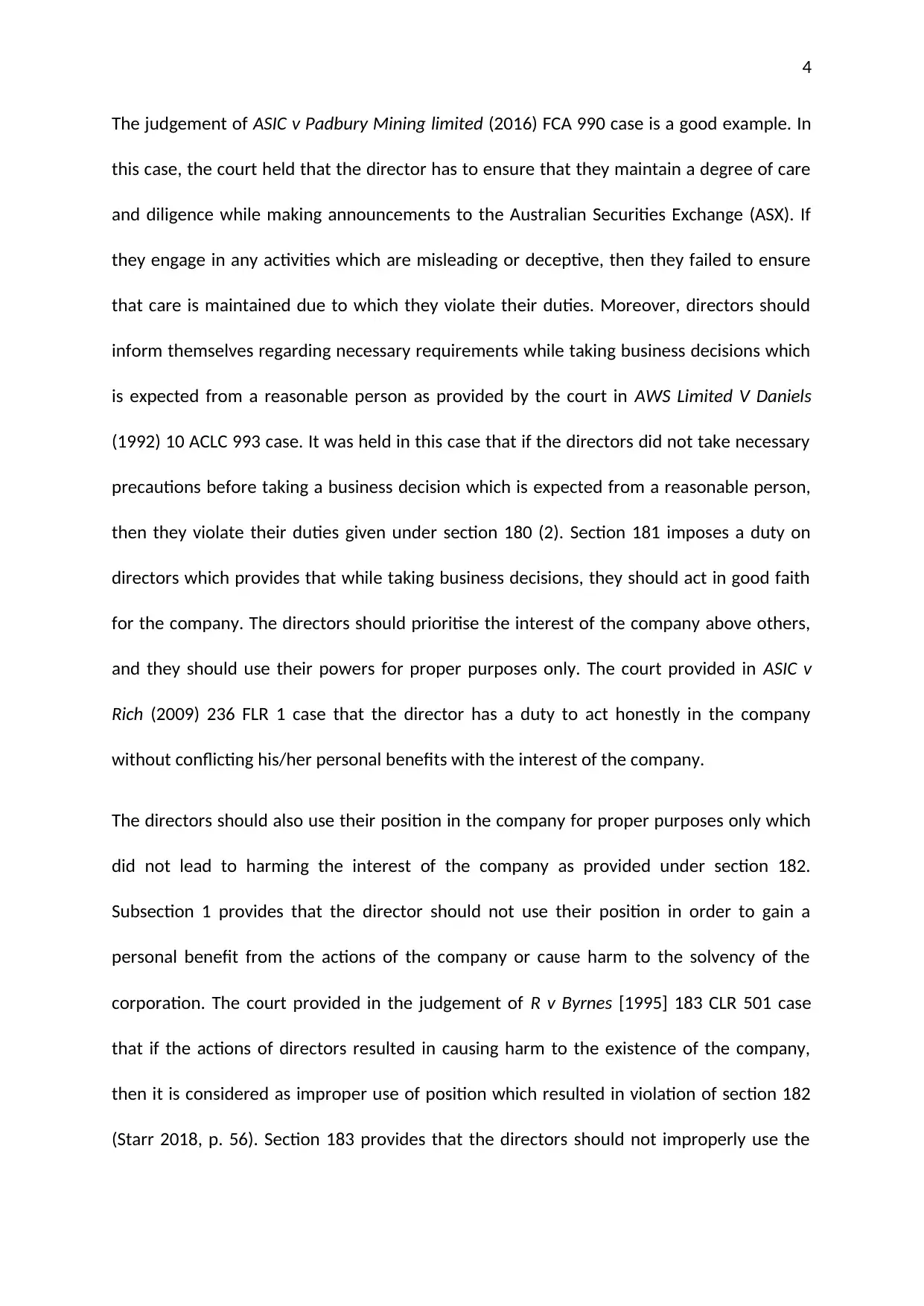
4
The judgement of ASIC v Padbury Mining limited (2016) FCA 990 case is a good example. In
this case, the court held that the director has to ensure that they maintain a degree of care
and diligence while making announcements to the Australian Securities Exchange (ASX). If
they engage in any activities which are misleading or deceptive, then they failed to ensure
that care is maintained due to which they violate their duties. Moreover, directors should
inform themselves regarding necessary requirements while taking business decisions which
is expected from a reasonable person as provided by the court in AWS Limited V Daniels
(1992) 10 ACLC 993 case. It was held in this case that if the directors did not take necessary
precautions before taking a business decision which is expected from a reasonable person,
then they violate their duties given under section 180 (2). Section 181 imposes a duty on
directors which provides that while taking business decisions, they should act in good faith
for the company. The directors should prioritise the interest of the company above others,
and they should use their powers for proper purposes only. The court provided in ASIC v
Rich (2009) 236 FLR 1 case that the director has a duty to act honestly in the company
without conflicting his/her personal benefits with the interest of the company.
The directors should also use their position in the company for proper purposes only which
did not lead to harming the interest of the company as provided under section 182.
Subsection 1 provides that the director should not use their position in order to gain a
personal benefit from the actions of the company or cause harm to the solvency of the
corporation. The court provided in the judgement of R v Byrnes [1995] 183 CLR 501 case
that if the actions of directors resulted in causing harm to the existence of the company,
then it is considered as improper use of position which resulted in violation of section 182
(Starr 2018, p. 56). Section 183 provides that the directors should not improperly use the
The judgement of ASIC v Padbury Mining limited (2016) FCA 990 case is a good example. In
this case, the court held that the director has to ensure that they maintain a degree of care
and diligence while making announcements to the Australian Securities Exchange (ASX). If
they engage in any activities which are misleading or deceptive, then they failed to ensure
that care is maintained due to which they violate their duties. Moreover, directors should
inform themselves regarding necessary requirements while taking business decisions which
is expected from a reasonable person as provided by the court in AWS Limited V Daniels
(1992) 10 ACLC 993 case. It was held in this case that if the directors did not take necessary
precautions before taking a business decision which is expected from a reasonable person,
then they violate their duties given under section 180 (2). Section 181 imposes a duty on
directors which provides that while taking business decisions, they should act in good faith
for the company. The directors should prioritise the interest of the company above others,
and they should use their powers for proper purposes only. The court provided in ASIC v
Rich (2009) 236 FLR 1 case that the director has a duty to act honestly in the company
without conflicting his/her personal benefits with the interest of the company.
The directors should also use their position in the company for proper purposes only which
did not lead to harming the interest of the company as provided under section 182.
Subsection 1 provides that the director should not use their position in order to gain a
personal benefit from the actions of the company or cause harm to the solvency of the
corporation. The court provided in the judgement of R v Byrnes [1995] 183 CLR 501 case
that if the actions of directors resulted in causing harm to the existence of the company,
then it is considered as improper use of position which resulted in violation of section 182
(Starr 2018, p. 56). Section 183 provides that the directors should not improperly use the
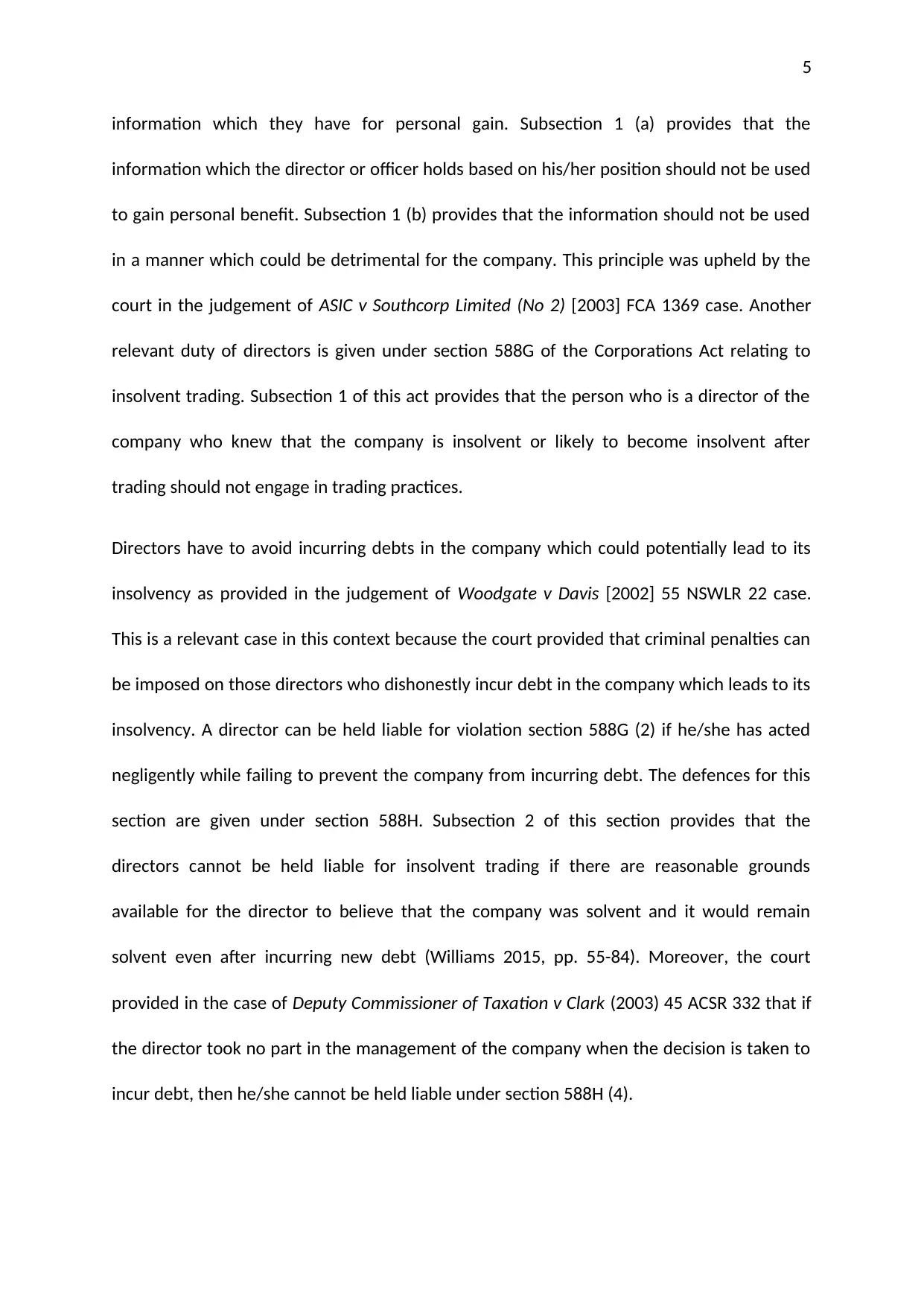
5
information which they have for personal gain. Subsection 1 (a) provides that the
information which the director or officer holds based on his/her position should not be used
to gain personal benefit. Subsection 1 (b) provides that the information should not be used
in a manner which could be detrimental for the company. This principle was upheld by the
court in the judgement of ASIC v Southcorp Limited (No 2) [2003] FCA 1369 case. Another
relevant duty of directors is given under section 588G of the Corporations Act relating to
insolvent trading. Subsection 1 of this act provides that the person who is a director of the
company who knew that the company is insolvent or likely to become insolvent after
trading should not engage in trading practices.
Directors have to avoid incurring debts in the company which could potentially lead to its
insolvency as provided in the judgement of Woodgate v Davis [2002] 55 NSWLR 22 case.
This is a relevant case in this context because the court provided that criminal penalties can
be imposed on those directors who dishonestly incur debt in the company which leads to its
insolvency. A director can be held liable for violation section 588G (2) if he/she has acted
negligently while failing to prevent the company from incurring debt. The defences for this
section are given under section 588H. Subsection 2 of this section provides that the
directors cannot be held liable for insolvent trading if there are reasonable grounds
available for the director to believe that the company was solvent and it would remain
solvent even after incurring new debt (Williams 2015, pp. 55-84). Moreover, the court
provided in the case of Deputy Commissioner of Taxation v Clark (2003) 45 ACSR 332 that if
the director took no part in the management of the company when the decision is taken to
incur debt, then he/she cannot be held liable under section 588H (4).
information which they have for personal gain. Subsection 1 (a) provides that the
information which the director or officer holds based on his/her position should not be used
to gain personal benefit. Subsection 1 (b) provides that the information should not be used
in a manner which could be detrimental for the company. This principle was upheld by the
court in the judgement of ASIC v Southcorp Limited (No 2) [2003] FCA 1369 case. Another
relevant duty of directors is given under section 588G of the Corporations Act relating to
insolvent trading. Subsection 1 of this act provides that the person who is a director of the
company who knew that the company is insolvent or likely to become insolvent after
trading should not engage in trading practices.
Directors have to avoid incurring debts in the company which could potentially lead to its
insolvency as provided in the judgement of Woodgate v Davis [2002] 55 NSWLR 22 case.
This is a relevant case in this context because the court provided that criminal penalties can
be imposed on those directors who dishonestly incur debt in the company which leads to its
insolvency. A director can be held liable for violation section 588G (2) if he/she has acted
negligently while failing to prevent the company from incurring debt. The defences for this
section are given under section 588H. Subsection 2 of this section provides that the
directors cannot be held liable for insolvent trading if there are reasonable grounds
available for the director to believe that the company was solvent and it would remain
solvent even after incurring new debt (Williams 2015, pp. 55-84). Moreover, the court
provided in the case of Deputy Commissioner of Taxation v Clark (2003) 45 ACSR 332 that if
the director took no part in the management of the company when the decision is taken to
incur debt, then he/she cannot be held liable under section 588H (4).
⊘ This is a preview!⊘
Do you want full access?
Subscribe today to unlock all pages.

Trusted by 1+ million students worldwide
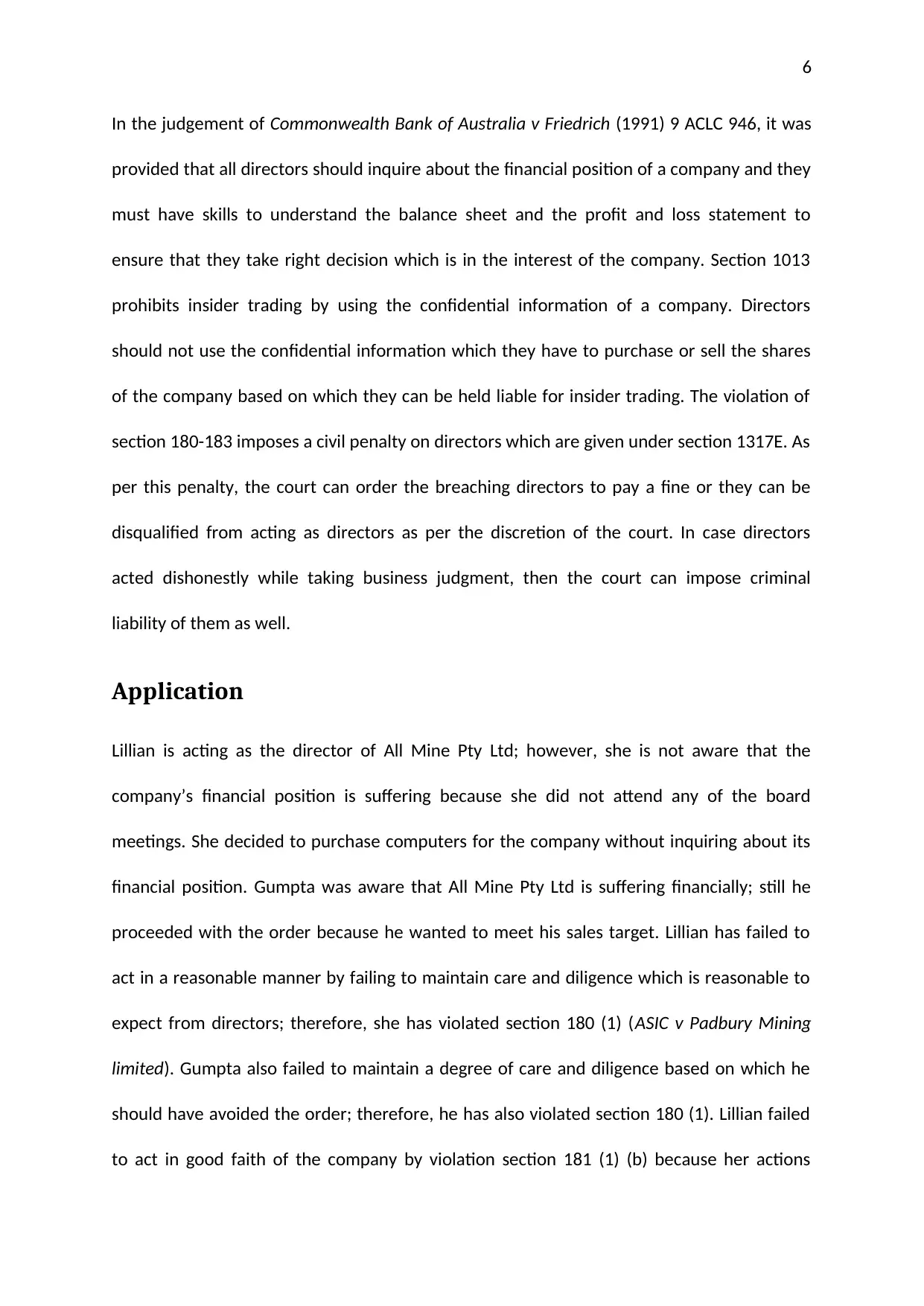
6
In the judgement of Commonwealth Bank of Australia v Friedrich (1991) 9 ACLC 946, it was
provided that all directors should inquire about the financial position of a company and they
must have skills to understand the balance sheet and the profit and loss statement to
ensure that they take right decision which is in the interest of the company. Section 1013
prohibits insider trading by using the confidential information of a company. Directors
should not use the confidential information which they have to purchase or sell the shares
of the company based on which they can be held liable for insider trading. The violation of
section 180-183 imposes a civil penalty on directors which are given under section 1317E. As
per this penalty, the court can order the breaching directors to pay a fine or they can be
disqualified from acting as directors as per the discretion of the court. In case directors
acted dishonestly while taking business judgment, then the court can impose criminal
liability of them as well.
Application
Lillian is acting as the director of All Mine Pty Ltd; however, she is not aware that the
company’s financial position is suffering because she did not attend any of the board
meetings. She decided to purchase computers for the company without inquiring about its
financial position. Gumpta was aware that All Mine Pty Ltd is suffering financially; still he
proceeded with the order because he wanted to meet his sales target. Lillian has failed to
act in a reasonable manner by failing to maintain care and diligence which is reasonable to
expect from directors; therefore, she has violated section 180 (1) (ASIC v Padbury Mining
limited). Gumpta also failed to maintain a degree of care and diligence based on which he
should have avoided the order; therefore, he has also violated section 180 (1). Lillian failed
to act in good faith of the company by violation section 181 (1) (b) because her actions
In the judgement of Commonwealth Bank of Australia v Friedrich (1991) 9 ACLC 946, it was
provided that all directors should inquire about the financial position of a company and they
must have skills to understand the balance sheet and the profit and loss statement to
ensure that they take right decision which is in the interest of the company. Section 1013
prohibits insider trading by using the confidential information of a company. Directors
should not use the confidential information which they have to purchase or sell the shares
of the company based on which they can be held liable for insider trading. The violation of
section 180-183 imposes a civil penalty on directors which are given under section 1317E. As
per this penalty, the court can order the breaching directors to pay a fine or they can be
disqualified from acting as directors as per the discretion of the court. In case directors
acted dishonestly while taking business judgment, then the court can impose criminal
liability of them as well.
Application
Lillian is acting as the director of All Mine Pty Ltd; however, she is not aware that the
company’s financial position is suffering because she did not attend any of the board
meetings. She decided to purchase computers for the company without inquiring about its
financial position. Gumpta was aware that All Mine Pty Ltd is suffering financially; still he
proceeded with the order because he wanted to meet his sales target. Lillian has failed to
act in a reasonable manner by failing to maintain care and diligence which is reasonable to
expect from directors; therefore, she has violated section 180 (1) (ASIC v Padbury Mining
limited). Gumpta also failed to maintain a degree of care and diligence based on which he
should have avoided the order; therefore, he has also violated section 180 (1). Lillian failed
to act in good faith of the company by violation section 181 (1) (b) because her actions
Paraphrase This Document
Need a fresh take? Get an instant paraphrase of this document with our AI Paraphraser
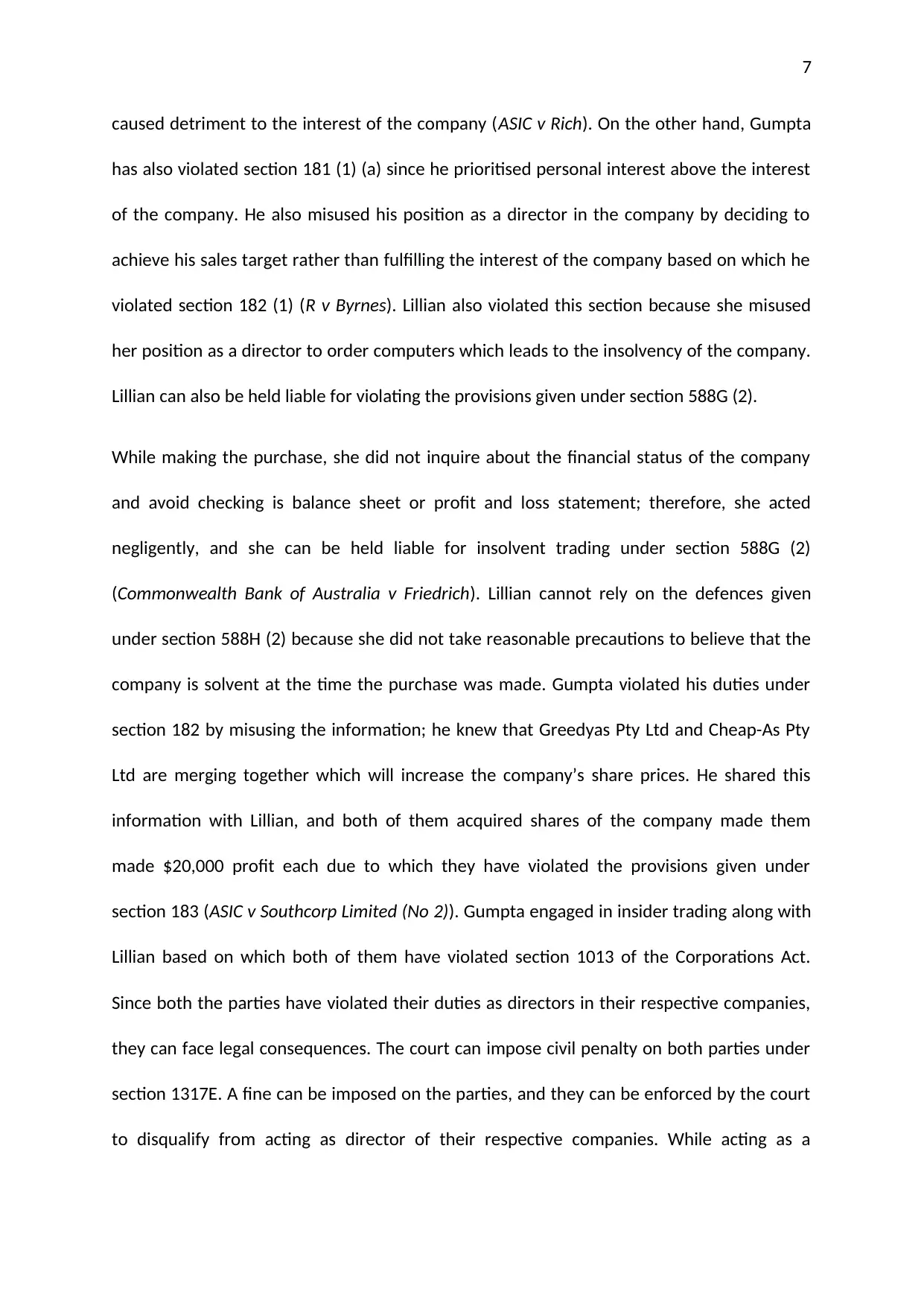
7
caused detriment to the interest of the company (ASIC v Rich). On the other hand, Gumpta
has also violated section 181 (1) (a) since he prioritised personal interest above the interest
of the company. He also misused his position as a director in the company by deciding to
achieve his sales target rather than fulfilling the interest of the company based on which he
violated section 182 (1) (R v Byrnes). Lillian also violated this section because she misused
her position as a director to order computers which leads to the insolvency of the company.
Lillian can also be held liable for violating the provisions given under section 588G (2).
While making the purchase, she did not inquire about the financial status of the company
and avoid checking is balance sheet or profit and loss statement; therefore, she acted
negligently, and she can be held liable for insolvent trading under section 588G (2)
(Commonwealth Bank of Australia v Friedrich). Lillian cannot rely on the defences given
under section 588H (2) because she did not take reasonable precautions to believe that the
company is solvent at the time the purchase was made. Gumpta violated his duties under
section 182 by misusing the information; he knew that Greedyas Pty Ltd and Cheap-As Pty
Ltd are merging together which will increase the company’s share prices. He shared this
information with Lillian, and both of them acquired shares of the company made them
made $20,000 profit each due to which they have violated the provisions given under
section 183 (ASIC v Southcorp Limited (No 2)). Gumpta engaged in insider trading along with
Lillian based on which both of them have violated section 1013 of the Corporations Act.
Since both the parties have violated their duties as directors in their respective companies,
they can face legal consequences. The court can impose civil penalty on both parties under
section 1317E. A fine can be imposed on the parties, and they can be enforced by the court
to disqualify from acting as director of their respective companies. While acting as a
caused detriment to the interest of the company (ASIC v Rich). On the other hand, Gumpta
has also violated section 181 (1) (a) since he prioritised personal interest above the interest
of the company. He also misused his position as a director in the company by deciding to
achieve his sales target rather than fulfilling the interest of the company based on which he
violated section 182 (1) (R v Byrnes). Lillian also violated this section because she misused
her position as a director to order computers which leads to the insolvency of the company.
Lillian can also be held liable for violating the provisions given under section 588G (2).
While making the purchase, she did not inquire about the financial status of the company
and avoid checking is balance sheet or profit and loss statement; therefore, she acted
negligently, and she can be held liable for insolvent trading under section 588G (2)
(Commonwealth Bank of Australia v Friedrich). Lillian cannot rely on the defences given
under section 588H (2) because she did not take reasonable precautions to believe that the
company is solvent at the time the purchase was made. Gumpta violated his duties under
section 182 by misusing the information; he knew that Greedyas Pty Ltd and Cheap-As Pty
Ltd are merging together which will increase the company’s share prices. He shared this
information with Lillian, and both of them acquired shares of the company made them
made $20,000 profit each due to which they have violated the provisions given under
section 183 (ASIC v Southcorp Limited (No 2)). Gumpta engaged in insider trading along with
Lillian based on which both of them have violated section 1013 of the Corporations Act.
Since both the parties have violated their duties as directors in their respective companies,
they can face legal consequences. The court can impose civil penalty on both parties under
section 1317E. A fine can be imposed on the parties, and they can be enforced by the court
to disqualify from acting as director of their respective companies. While acting as a
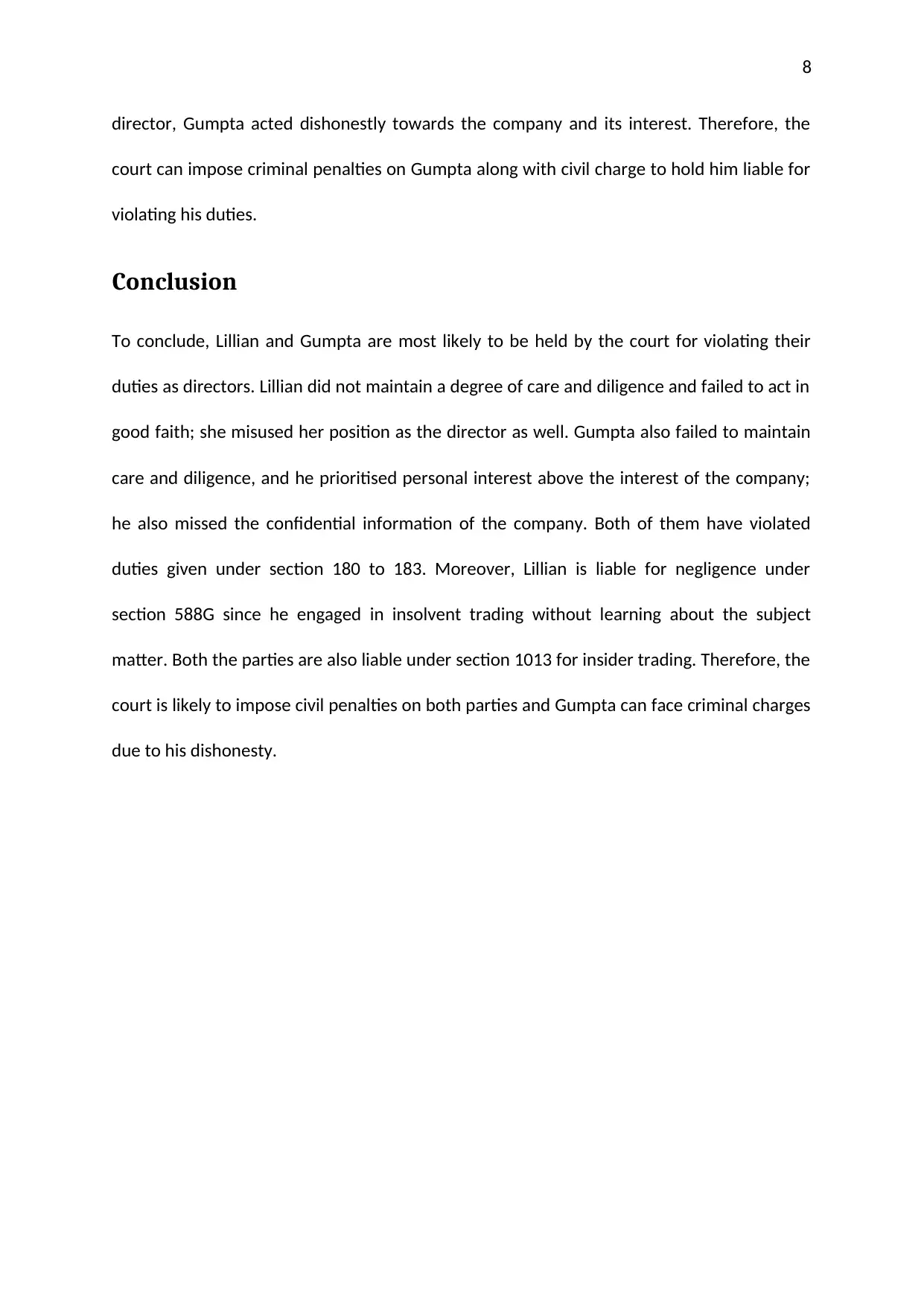
8
director, Gumpta acted dishonestly towards the company and its interest. Therefore, the
court can impose criminal penalties on Gumpta along with civil charge to hold him liable for
violating his duties.
Conclusion
To conclude, Lillian and Gumpta are most likely to be held by the court for violating their
duties as directors. Lillian did not maintain a degree of care and diligence and failed to act in
good faith; she misused her position as the director as well. Gumpta also failed to maintain
care and diligence, and he prioritised personal interest above the interest of the company;
he also missed the confidential information of the company. Both of them have violated
duties given under section 180 to 183. Moreover, Lillian is liable for negligence under
section 588G since he engaged in insolvent trading without learning about the subject
matter. Both the parties are also liable under section 1013 for insider trading. Therefore, the
court is likely to impose civil penalties on both parties and Gumpta can face criminal charges
due to his dishonesty.
director, Gumpta acted dishonestly towards the company and its interest. Therefore, the
court can impose criminal penalties on Gumpta along with civil charge to hold him liable for
violating his duties.
Conclusion
To conclude, Lillian and Gumpta are most likely to be held by the court for violating their
duties as directors. Lillian did not maintain a degree of care and diligence and failed to act in
good faith; she misused her position as the director as well. Gumpta also failed to maintain
care and diligence, and he prioritised personal interest above the interest of the company;
he also missed the confidential information of the company. Both of them have violated
duties given under section 180 to 183. Moreover, Lillian is liable for negligence under
section 588G since he engaged in insolvent trading without learning about the subject
matter. Both the parties are also liable under section 1013 for insider trading. Therefore, the
court is likely to impose civil penalties on both parties and Gumpta can face criminal charges
due to his dishonesty.
⊘ This is a preview!⊘
Do you want full access?
Subscribe today to unlock all pages.

Trusted by 1+ million students worldwide
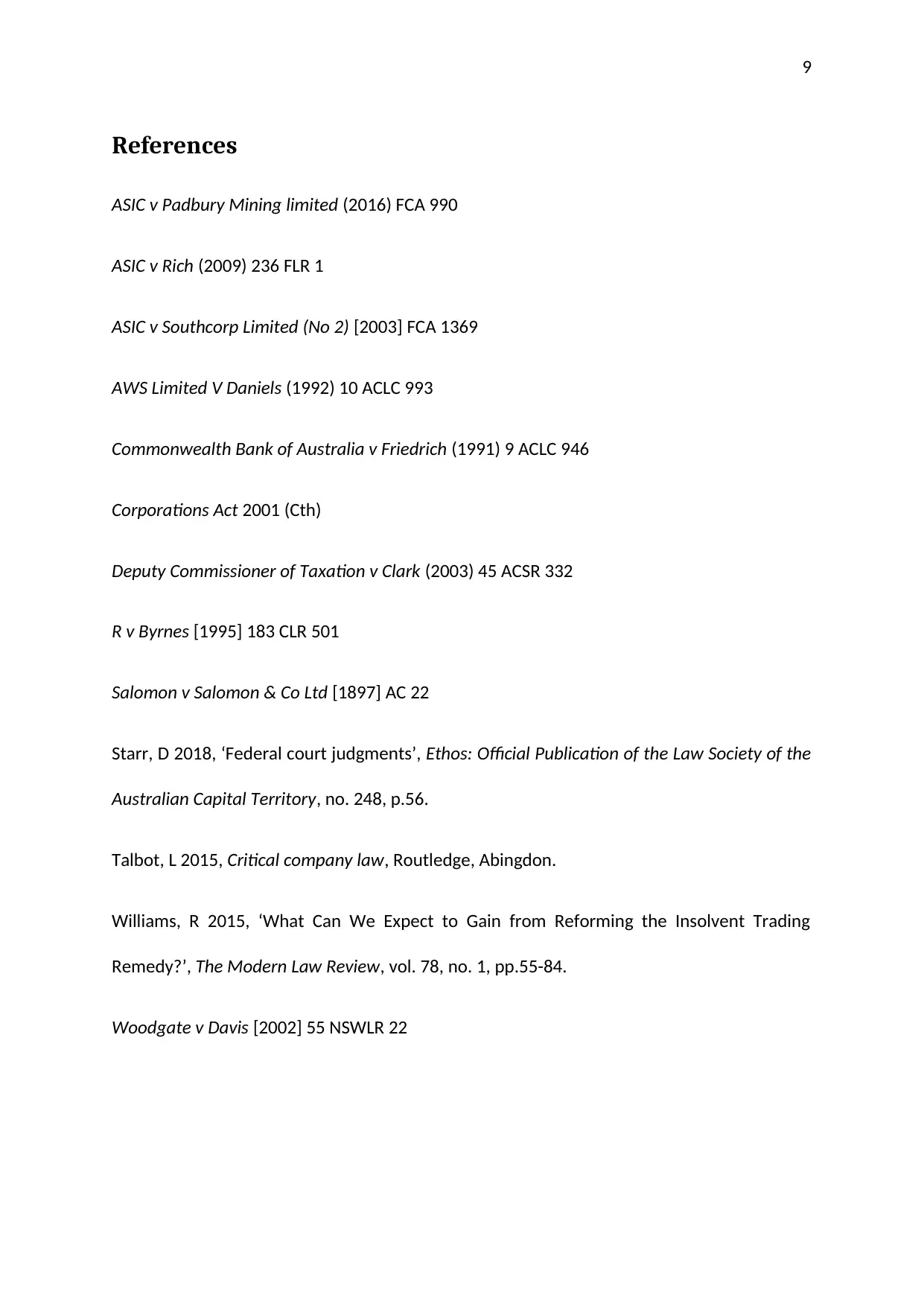
9
References
ASIC v Padbury Mining limited (2016) FCA 990
ASIC v Rich (2009) 236 FLR 1
ASIC v Southcorp Limited (No 2) [2003] FCA 1369
AWS Limited V Daniels (1992) 10 ACLC 993
Commonwealth Bank of Australia v Friedrich (1991) 9 ACLC 946
Corporations Act 2001 (Cth)
Deputy Commissioner of Taxation v Clark (2003) 45 ACSR 332
R v Byrnes [1995] 183 CLR 501
Salomon v Salomon & Co Ltd [1897] AC 22
Starr, D 2018, ‘Federal court judgments’, Ethos: Official Publication of the Law Society of the
Australian Capital Territory, no. 248, p.56.
Talbot, L 2015, Critical company law, Routledge, Abingdon.
Williams, R 2015, ‘What Can We Expect to Gain from Reforming the Insolvent Trading
Remedy?’, The Modern Law Review, vol. 78, no. 1, pp.55-84.
Woodgate v Davis [2002] 55 NSWLR 22
References
ASIC v Padbury Mining limited (2016) FCA 990
ASIC v Rich (2009) 236 FLR 1
ASIC v Southcorp Limited (No 2) [2003] FCA 1369
AWS Limited V Daniels (1992) 10 ACLC 993
Commonwealth Bank of Australia v Friedrich (1991) 9 ACLC 946
Corporations Act 2001 (Cth)
Deputy Commissioner of Taxation v Clark (2003) 45 ACSR 332
R v Byrnes [1995] 183 CLR 501
Salomon v Salomon & Co Ltd [1897] AC 22
Starr, D 2018, ‘Federal court judgments’, Ethos: Official Publication of the Law Society of the
Australian Capital Territory, no. 248, p.56.
Talbot, L 2015, Critical company law, Routledge, Abingdon.
Williams, R 2015, ‘What Can We Expect to Gain from Reforming the Insolvent Trading
Remedy?’, The Modern Law Review, vol. 78, no. 1, pp.55-84.
Woodgate v Davis [2002] 55 NSWLR 22
1 out of 10
Related Documents
Your All-in-One AI-Powered Toolkit for Academic Success.
+13062052269
info@desklib.com
Available 24*7 on WhatsApp / Email
![[object Object]](/_next/static/media/star-bottom.7253800d.svg)
Unlock your academic potential
Copyright © 2020–2026 A2Z Services. All Rights Reserved. Developed and managed by ZUCOL.





